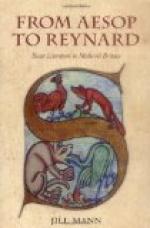|
This section contains 8,980 words (approx. 30 pages at 300 words per page) |

|
SOURCE: “Trickery as an Element of the Character of Renart,” in Forum for Modern Language Studies, Vol. 22, No. 1, 1986, pp. 34-52.
In the following essay, Bellon examines Renart's ability to innovate, his tactics, and the nature of his defense arguments.
If trickery is defined as a “means of obtaining from others that which cannot be obtained by force, work or right”, it clearly emerges from the full text of the Roman de Renart1 that trickery is vitally important to Renart, both as animal and man, for several reasons:
—to obtain food. Without trickery, a predator of Renart's size and strength would almost certainly die of hunger.
—to avenge himself.2 His hereditary enemies all have a decisive advantage over him: Isengrin for example possesses the physical strength which Renart lacks, while Tibert can climb trees.
—to defend himself. At the Court, where he has been taken because of his earlier...
|
This section contains 8,980 words (approx. 30 pages at 300 words per page) |

|


